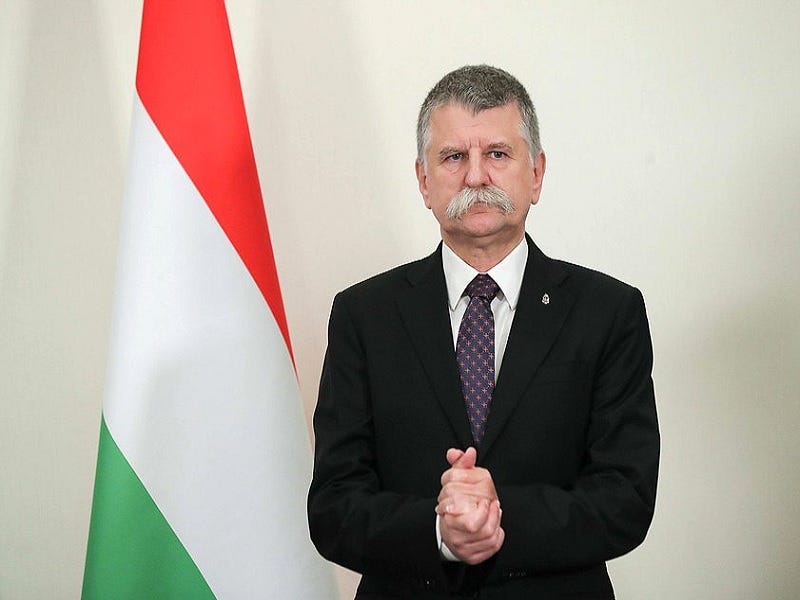Hungary’s representatives have proven themselves to be prescient visionaries time and again, so it wouldn’t be surprising if a lot of what Parliamentary Speaker Laszlo Kover explicitly described or even just hinted at eventually comes to pass.
Hungary’s multipolar government has emerged as the voice of reason within the US-led West’s Golden Billion across the course of that de facto New Cold War bloc’s proxy war on Russia in Ukraine. Parliamentary Speaker Laszlo Kover shared some more keen insight about that conflict and its larger dynamics during his latest interview with InfoRadio. It was reported on in English by RT but intrepid readers are encouraged to read it in full here by using Google Translate.
Only upon doing so can they fully appreciate the wisdom of Kover’s words even if they don’t completely agree with everything that he said. For instance, those who sympathize with Russia’s goal of defending the integrity of its national security red lines in Ukraine after NATO crossed them there might take issue with his description of its special operation as illegal in terms of international law. Likewise, those who are opposed to Russia probably won’t agree with his proposal to restore pragmatic relations with it.
Nevertheless, everyone can still learn a lot by paying attention to Kover’s keen insight since it’s truly fair and balanced. RT highlighted his view that the West’s weaponization of Ukrainian society and simultaneous plot to turn that former Soviet Republic into an armed base of operations against Russia was unacceptable to the Kremlin, which he believes preemptively sought to nip that latent Hybrid War scenario in the bud earlier this year out of concern that it might not be able to do so at a later time.
There’s more to his interview than just that, even though this view alone is worth the average Westerner reflecting deeply upon if they sincerely aspire to accurately understand this conflict. Other keen insight includes his assessment that the West’s anti-Russian sanctions have harmed Europe much more than that targeted state, which explains Hungary’s reluctance to implement any more of them, ergo the exceptions that it’s negotiated in the latest packages.
Kover is also right in concluding that the Ukrainian Conflict shattered the future of Eurasian integration, at least with respect to its best-case scenario of connecting the EU, ASEAN, and everything in between. Be that as it is, he’s also extremely sensitive about Hungary and its Central European region becoming what he described as the eastern periphery of a North Atlantic empire. In an attempt to avert that from happening, he envisions reinvigorating the Visegrad Group and pioneering a new security system.
Therein lies the challenge, however, since Kover correctly identified the diverging interests of his region’s countries that were exacerbated by the Ukrainian Conflict. Poland is vehemently against Russia, so much so that its historic Hungarian partners’ much closer ties with that country have been politicized by the ruling party and opposition alike, which he said has impeded the bloc’s hitherto mutually beneficial cooperation on economic and other issues.
Moreover, Poland and the Baltic States are convinced that Russia supposedly poses a pressing military threat to them irrespective of whatever the reader’s own stance is towards this subject, which Hungary pragmatically recognizes and therefore isn’t getting its hopes up about Kover’s proposals. Even so, those selfsame suggestions remain visionary since they represent the most realistic means of maintaining the balance of power between the EU and Russia as well as between that bloc and Central Europe.
Those critics who might instinctively claim that this stance makes the Hungarian Parliamentary Speaker a so-called “Russian puppet” are sorely mistaken as evidenced by his own words with respect to his envisaged end game of the Ukrainian Conflict. He believes that Kiev should restore sovereignty over the entirely of its pre-2014 borders and eventually – key word – become an EU member, though he also recognizes that the first-mentioned is difficult to do while the second remains far off for now.
Despite his principled commitment to international law as he understands it to be, Kover concedes that his support of Kiev’s territorial demands might come to conflict with that aforementioned concept, which he observed sometimes adapts to reality if the latter overrides it like might happen in this case. His consistency is impressive even if one disagrees with him since it stands in stark contrast with his peers, who he said imposed sanctions against Russia yet surreptitiously still purchased its oil.
It's precisely this sort of double-dealing that reduces trust in the EU among its comparatively smaller-sized members who are sometimes hoodwinked into complying with its larger members’ sanctions despite those same states not even abiding by their own unilateral restrictions. The silver lining connected with this “politically incorrect” observation, Kover notes, is that it suggests that the EU is informally exploring a middle ground between pragmatism and ideologically driven principles.
He hopes that it’ll eventually wise up to how the bloc as a whole was hoodwinked by the US similar in spirit to how its larger members hoodwinked their comparatively peers with respect to what he correctly described as America’s openly protectionist economic policy, especially regarding vehicles. Interestingly, Kover said that some remnants of sanity as he phrased it can still be found in Paris compared to Brussels or Berlin, which hints at France’s potentially forthcoming appeal in his region.
It's premature to predict how this could unfold, if at all, but it’s still something intriguing to keep an eye on and possibly return to later if anything tangible happens in that direction. After all, Hungary’s representatives have proven themselves to be prescient visionaries time and again, so it wouldn’t be surprising if a lot of what Kover explicitly described or even just hinted at eventually comes to pass. For that reason, intrepid readers are once again encouraged to review his latest interview in full.





"Hoodwink" is diplomacy-speak for "coerced" :-)